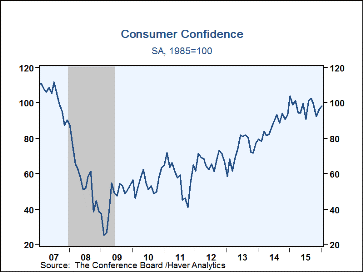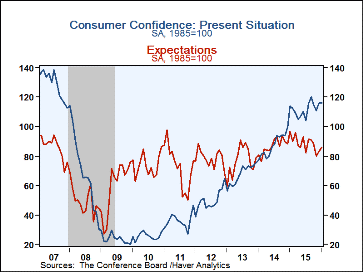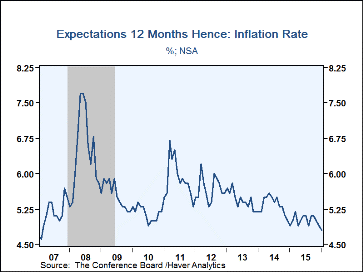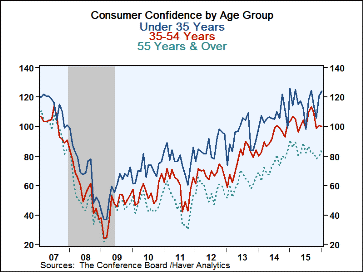 Global| Jan 26 2016
Global| Jan 26 2016U.S. Consumer Confidence Strengthens
by:Tom Moeller
|in:Economy in Brief
Summary
The Conference Board's Consumer Confidence Index during January rose 1.9% to 98.1 following a 4.0% rise in December to 96.3, revised from 96.5. Consensus expectations had been for a reading of 96.1, according to the Action Economics [...]
The Conference Board's Consumer Confidence Index during January rose 1.9% to 98.1 following a 4.0% rise in December to 96.3, revised from 96.5. Consensus expectations had been for a reading of 96.1, according to the Action Economics Forecast Survey. An improved expectations reading led last month's increase with a 3.5% rise, down 11.4% y/y. The present situations figure was unchanged m/m (2.2% y/y) following a 5.0% December gain.
The share of consumers believing business conditions are good held fairly steady at 27.2%, and the share believing conditions are bad eased to 18.5%. The assessment of the job market deteriorated slightly as the number believing that jobs are plentiful fell to 22.4% but remained in the range of the last six months. Jobs were viewed as hard to get by a lessened 23.4%, down from the 2011 high of 49.4%.
Expectations that business conditions would get better nudged up to 16.2% of respondents while 10.3% expected a worsening. More jobs were expected by a still low 13.2%, while 16.5% expected fewer jobs. Income was expected to increase by 18.1%; 10.8% expected less.
The inflation rate was projected to fall to 4.8%, the lowest figure since early-2007. Interest rates were expected to rise by a sharply increased 72.4% of respondents, up from 56.6% one year ago.
A sharply higher 6.6% of respondents planned to buy a home within six months, up from 4.4% in August. Major appliance buying was scheduled by 52.4% of respondents, the highest level since July 2010.
Consumer confidence by age group improved to the highest level since August for those aged 55 and older. For those under aged 35 it rose to the highest level since September. Confidence amongst individuals aged 35-54 eased m/m and remained down sharply from the September high.
The Consumer Confidence data is available in Haver's CBDB database. The total indexes appear in USECON, and the market expectations are in AS1REPNA.
| Conference Board (SA, 1985=100) | Jan | Dec | Nov | Y/Y % | 2015 | 2014 | 2013 |
|---|---|---|---|---|---|---|---|
| Consumer Confidence Index | 98.1 | 96.3 | 92.6 | -5.5 | 98.0 | 86.9 | 73.2 |
| Present Situation | 116.4 | 116.4 | 110.9 | 2.2 | 111.6 | 87.4 | 67.6 |
| Expectations | 85.9 | 83.0 | 80.4 | -11.4 | 88.9 | 86.6 | 77.0 |
| Consumer Confidence By Age Group | |||||||
| Under 35 Years | 123.8 | 120.6 | 106.1 | -1.7 | 116.5 | 106.6 | 93.1 |
| Aged 35-54 Years | 100.3 | 100.6 | 98.5 | -3.2 | 103.8 | 92.4 | 76.8 |
| Over 55 Years | 84.0 | 79.8 | 78.5 | -7.8 | 84.0 | 73.8 | 61.2 |
Tom Moeller
AuthorMore in Author Profile »Prior to joining Haver Analytics in 2000, Mr. Moeller worked as the Economist at Chancellor Capital Management from 1985 to 1999. There, he developed comprehensive economic forecasts and interpreted economic data for equity and fixed income portfolio managers. Also at Chancellor, Mr. Moeller worked as an equity analyst and was responsible for researching and rating companies in the economically sensitive automobile and housing industries for investment in Chancellor’s equity portfolio. Prior to joining Chancellor, Mr. Moeller was an Economist at Citibank from 1979 to 1984. He also analyzed pricing behavior in the metals industry for the Council on Wage and Price Stability in Washington, D.C. In 1999, Mr. Moeller received the award for most accurate forecast from the Forecasters' Club of New York. From 1990 to 1992 he was President of the New York Association for Business Economists. Mr. Moeller earned an M.B.A. in Finance from Fordham University, where he graduated in 1987. He holds a Bachelor of Arts in Economics from George Washington University.
More Economy in Brief
 Global| Feb 05 2026
Global| Feb 05 2026Charts of the Week: Balanced Policy, Resilient Data and AI Narratives
by:Andrew Cates










